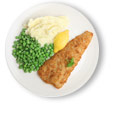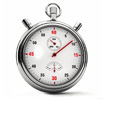Gradually decrease the amount of caffeine you consume.
 Replace your normal caffeinated beverage with decaf coffee, decaf tea or a non-caffeinated drink. Patients who stop consuming caffeine suddenly at the time of surgery may experience symptoms of withdrawal, such as intense headaches.
Replace your normal caffeinated beverage with decaf coffee, decaf tea or a non-caffeinated drink. Patients who stop consuming caffeine suddenly at the time of surgery may experience symptoms of withdrawal, such as intense headaches.
Reduce the amount of cold, carbonated beverages you consume.
 Carbonated beverages, such as sodas/soft drinks, contain compressed gas. When this cold gas reaches your 99.5 degree stomach, your stomach is forced to expand.
Carbonated beverages, such as sodas/soft drinks, contain compressed gas. When this cold gas reaches your 99.5 degree stomach, your stomach is forced to expand.
Reduce the amount of high sugar foods in your diet.
 Reduce your intake of foods containing refined sugars, such as doughnuts, cakes and candy, as well as products containing sucrose. Introduce more whole grains, fresh fruits, fresh vegetables, low fat dairy products and lean meats into your daily diet.
Reduce your intake of foods containing refined sugars, such as doughnuts, cakes and candy, as well as products containing sucrose. Introduce more whole grains, fresh fruits, fresh vegetables, low fat dairy products and lean meats into your daily diet.
Start reducing meal portions and fat intake.
 Choose sensible portions of nutritious meals that are lower in fat. Also, try not to eat while watching TV, since this can negatively influence how much you eat. Also, start to keep records of your food intake. Click here to download our food intake journal page.
Choose sensible portions of nutritious meals that are lower in fat. Also, try not to eat while watching TV, since this can negatively influence how much you eat. Also, start to keep records of your food intake. Click here to download our food intake journal page.
Eat at a slower pace.
 Eating slowly gradually reduces your appetite and allows you to eat less without feeling deprived. Plus, you’ll actually enjoy the taste of your food more!
Eating slowly gradually reduces your appetite and allows you to eat less without feeling deprived. Plus, you’ll actually enjoy the taste of your food more!
Gradually increase your daily amount of physical activity.
 Engage in at least 30 minutes of physical activity each day. Walking is a great exercise! Also, keep records of your physical activity each day. Click here to download our physical activity journal page.
Engage in at least 30 minutes of physical activity each day. Walking is a great exercise! Also, keep records of your physical activity each day. Click here to download our physical activity journal page.
Stop smoking.
 According to the American Cancer Society, smoking lowers the amount of oxygen in your body and negatively affects your blood circulation. In addition to impeding your healing process following surgery, smoking increases your chance of infections, forming painful ulcers, as well as inflammations in your intestines and stomach.
According to the American Cancer Society, smoking lowers the amount of oxygen in your body and negatively affects your blood circulation. In addition to impeding your healing process following surgery, smoking increases your chance of infections, forming painful ulcers, as well as inflammations in your intestines and stomach.
Determine the reason(s) why you are obese.
 Obesity is caused by many different factors, such as genetics, medical conditions and lifestyle habits. In many cases, psychological and emotional issues influence eating habits and obesity – including boredom, frustration, sadness, depression, loneliness, stress, anxiety and anger. Emotional eating is a common way to sabotage weight loss. Become aware of the situations and emotions that trigger overeating.
Obesity is caused by many different factors, such as genetics, medical conditions and lifestyle habits. In many cases, psychological and emotional issues influence eating habits and obesity – including boredom, frustration, sadness, depression, loneliness, stress, anxiety and anger. Emotional eating is a common way to sabotage weight loss. Become aware of the situations and emotions that trigger overeating.
Replace overeating with non-food related activities
 When you have the urge to overeat due to a negative emotion, try to distract yourself by participating in a non-food related activity: take a walk … read a book or magazine … call a family member or friend … work on a craft project … write in a journal. The key is to get your mind off of food.
When you have the urge to overeat due to a negative emotion, try to distract yourself by participating in a non-food related activity: take a walk … read a book or magazine … call a family member or friend … work on a craft project … write in a journal. The key is to get your mind off of food.
Think positive thoughts.
 Many times, you are your own worst critic. Just remember, the fact that you’re reading this demonstrates that you are taking action to improve your quality of life. Negative self-reflection can become so habitual that you accept it as fact. These negative thoughts can limit your opportunities, confidence, relationships and health. Take this weight loss journey as an opportunity to turn your thoughts around. Take the time to practice positive thinking as much as you have practiced self-disapproval. You can do it!
Many times, you are your own worst critic. Just remember, the fact that you’re reading this demonstrates that you are taking action to improve your quality of life. Negative self-reflection can become so habitual that you accept it as fact. These negative thoughts can limit your opportunities, confidence, relationships and health. Take this weight loss journey as an opportunity to turn your thoughts around. Take the time to practice positive thinking as much as you have practiced self-disapproval. You can do it!
Set smart, achievable daily goals.
 These include gradually decreasing the amount of caffeine, carbonated beverages, high sugar foods and fatty foods you consume; gradually increasing your physical activity; eating at a slower pace; reducing meal portions and quitting smoking. Remember, only set attainable goals – do not overwhelm yourself by tackling too much at one time. Every bit of effort makes a positive difference.
These include gradually decreasing the amount of caffeine, carbonated beverages, high sugar foods and fatty foods you consume; gradually increasing your physical activity; eating at a slower pace; reducing meal portions and quitting smoking. Remember, only set attainable goals – do not overwhelm yourself by tackling too much at one time. Every bit of effort makes a positive difference.
Reward yourself for accomplishing your goals. Every step you take toward achieving your weight loss goals is worthy of self-praise. Reward yourself for becoming one step closer to a happier, healthier you.
Featured Services
Bariatric & Weight Loss

Emergency Medicine
Wound Care & Hyperbaric Medicine
Mental Health, Adult and Geropsych

Surgical Services



